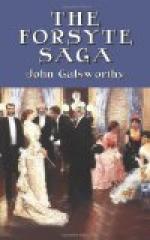Flight! But why should Bosinney fly? A man fled when he was in danger of destroying hearth and home, when there were children, when he felt himself trampling down ideals, breaking something. But here, so he had heard, it was all broken to his hand.
He himself had not fled, nor would he fly if it were all to come over again. Yet he had gone further than Bosinney, had broken up his own unhappy home, not someone else’s: And the old saying came back to him: ’A man’s fate lies in his own heart.’
In his own heart! The proof of the pudding was in the eating—Bosinney had still to eat his pudding.
His thoughts passed to the woman, the woman whom he did not know, but the outline of whose story he had heard.
An unhappy marriage! No ill-treatment—only that indefinable malaise, that terrible blight which killed all sweetness under Heaven; and so from day to day, from night to night, from week to week, from year to year, till death should end it.
But young Jolyon, the bitterness of whose own feelings time had assuaged, saw Soames’ side of the question too. Whence should a man like his cousin, saturated with all the prejudices and beliefs of his class, draw the insight or inspiration necessary to break up this life? It was a question of imagination, of projecting himself into the future beyond the unpleasant gossip, sneers, and tattle that followed on such separations, beyond the passing pangs that the lack of the sight of her would cause, beyond the grave disapproval of the worthy. But few men, and especially few men of Soames’ class, had imagination enough for that. A deal of mortals in this world, and not enough imagination to go round! And sweet Heaven, what a difference between theory and practice; many a man, perhaps even Soames, held chivalrous views on such matters, who when the shoe pinched found a distinguishing factor that made of himself an exception.
Then, too, he distrusted his judgment. He had been through the experience himself, had tasted too the dregs the bitterness of an unhappy marriage, and how could he take the wide and dispassionate view of those who had never been within sound of the battle? His evidence was too first-hand—like the evidence on military matters of a soldier who has been through much active service, against that of civilians who have not suffered the disadvantage of seeing things too close. Most people would consider such a marriage as that of Soames and Irene quite fairly successful; he had money, she had beauty; it was a case for compromise. There was no reason why they should not jog along, even if they hated each other. It would not matter if they went their own ways a little so long as the decencies were observed—the sanctity of the marriage tie, of the common home, respected. Half the marriages of the upper classes were conducted on these lines: Do not offend the susceptibilities of Society; do not offend the susceptibilities of the Church. To avoid offending these is worth the sacrifice of any private feelings. The advantages of the stable home are visible, tangible, so many pieces of property; there is no risk in the statu quo. To break up a home is at the best a dangerous experiment, and selfish into the bargain.




